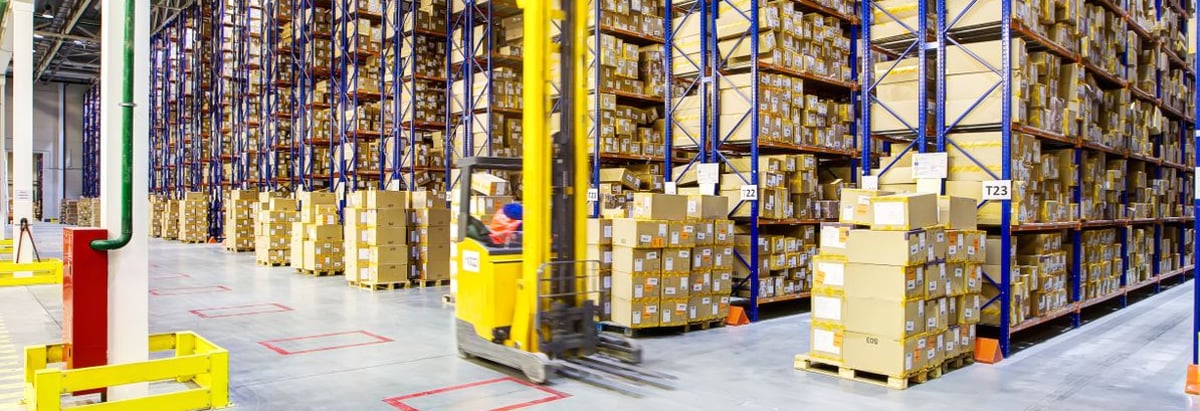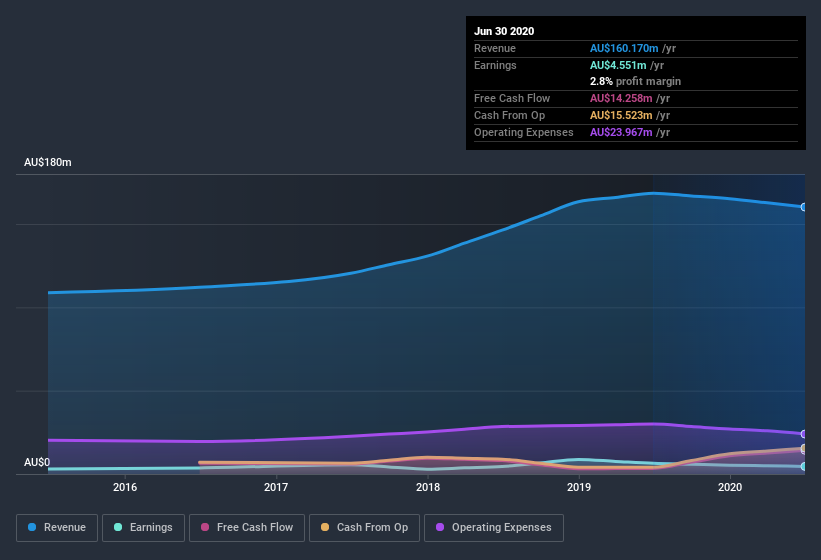- Australia
- /
- Retail Distributors
- /
- ASX:NTD
Are National Tyre & Wheel's (ASX:NTD) Statutory Earnings A Good Guide To Its Underlying Profitability?

It might be old fashioned, but we really like to invest in companies that make a profit, each and every year. However, sometimes companies receive a one-off boost (or reduction) to their profit, and it's not always clear whether statutory profits are a good guide, going forward. Today we'll focus on whether this year's statutory profits are a good guide to understanding National Tyre & Wheel (ASX:NTD).
While National Tyre & Wheel was able to generate revenue of AU$160.2m in the last twelve months, we think its profit result of AU$4.55m was more important. As you can see in the chart below, its profit has declined over the last three years, even though its revenue has increased.
Check out our latest analysis for National Tyre & Wheel

Of course, it is only sensible to look beyond the statutory profits and question how well those numbers represent the sustainable earnings power of the business. So this article aims to better understand National Tyre & Wheel's underlying earnings power by taking a look at how dilution, and unusual items are impacting it, and considering how well those paper profits are being converted into cash flow. That might leave you wondering what analysts are forecasting in terms of future profitability. Luckily, you can click here to see an interactive graph depicting future profitability, based on their estimates.
A Closer Look At National Tyre & Wheel's Earnings
In high finance, the key ratio used to measure how well a company converts reported profits into free cash flow (FCF) is the accrual ratio (from cashflow). To get the accrual ratio we first subtract FCF from profit for a period, and then divide that number by the average operating assets for the period. This ratio tells us how much of a company's profit is not backed by free cashflow.
Therefore, it's actually considered a good thing when a company has a negative accrual ratio, but a bad thing if its accrual ratio is positive. While it's not a problem to have a positive accrual ratio, indicating a certain level of non-cash profits, a high accrual ratio is arguably a bad thing, because it indicates paper profits are not matched by cash flow. To quote a 2014 paper by Lewellen and Resutek, "firms with higher accruals tend to be less profitable in the future".
For the year to June 2020, National Tyre & Wheel had an accrual ratio of -0.16. That indicates that its free cash flow quite significantly exceeded its statutory profit. In fact, it had free cash flow of AU$14m in the last year, which was a lot more than its statutory profit of AU$4.55m. National Tyre & Wheel's free cash flow improved over the last year, which is generally good to see. However, that's not the end of the story. We must also consider the impact of unusual items on statutory profit (and thus the accrual ratio), as well as note the ramifications of the company issuing new shares.
To understand the value of a company's earnings growth, it is imperative to consider any dilution of shareholders' interests. National Tyre & Wheel expanded the number of shares on issue by 11% over the last year. Therefore, each share now receives a smaller portion of profit. To celebrate net income while ignoring dilution is like rejoicing because you have a single slice of a larger pizza, but ignoring the fact that the pizza is now cut into many more slices. You can see a chart of National Tyre & Wheel's EPS by clicking here.
A Look At The Impact Of National Tyre & Wheel's Dilution on Its Earnings Per Share (EPS).
National Tyre & Wheel's net profit dropped by 17% per year over the last three years. Even looking at the last year, profit was still down 29%. Sadly, earnings per share fell further, down a full 29% in that time. So you can see that the dilution has had a bit of an impact on shareholders. Therefore, the dilution is having a noteworthy influence on shareholder returns. And so, you can see quite clearly that dilution is influencing shareholder earnings.
If National Tyre & Wheel's EPS can grow over time then that drastically improves the chances of the share price moving in the same direction. However, if its profit increases while its earnings per share stay flat (or even fall) then shareholders might not see much benefit. For that reason, you could say that EPS is more important that net income in the long run, assuming the goal is to assess whether a company's share price might grow.
How Do Unusual Items Influence Profit?
National Tyre & Wheel's profit was reduced by unusual items worth AU$2.2m in the last twelve months, and this helped it produce high cash conversion, as reflected by its unusual items. This is what you'd expect to see where a company has a non-cash charge reducing paper profits. While deductions due to unusual items are disappointing in the first instance, there is a silver lining. When we analysed the vast majority of listed companies worldwide, we found that significant unusual items are often not repeated. And that's hardly a surprise given these line items are considered unusual. Assuming those unusual expenses don't come up again, we'd therefore expect National Tyre & Wheel to produce a higher profit next year, all else being equal.
Our Take On National Tyre & Wheel's Profit Performance
In conclusion, both National Tyre & Wheel's accrual ratio and its unusual items suggest that its statutory earnings are probably reasonably conservative, but the dilution means that per-share performance is weaker than the statutory profit numbers imply. Based on these factors, we think National Tyre & Wheel's earnings potential is at least as good as it seems, and maybe even better! So while earnings quality is important, it's equally important to consider the risks facing National Tyre & Wheel at this point in time. Case in point: We've spotted 5 warning signs for National Tyre & Wheel you should be aware of.
After our examination into the nature of National Tyre & Wheel's profit, we've come away optimistic for the company. But there is always more to discover if you are capable of focussing your mind on minutiae. For example, many people consider a high return on equity as an indication of favorable business economics, while others like to 'follow the money' and search out stocks that insiders are buying. So you may wish to see this free collection of companies boasting high return on equity, or this list of stocks that insiders are buying.
If you decide to trade National Tyre & Wheel, use the lowest-cost* platform that is rated #1 Overall by Barron’s, Interactive Brokers. Trade stocks, options, futures, forex, bonds and funds on 135 markets, all from a single integrated account. Promoted
Valuation is complex, but we're here to simplify it.
Discover if NTAW Holdings might be undervalued or overvalued with our detailed analysis, featuring fair value estimates, potential risks, dividends, insider trades, and its financial condition.
Access Free AnalysisThis article by Simply Wall St is general in nature. It does not constitute a recommendation to buy or sell any stock, and does not take account of your objectives, or your financial situation. We aim to bring you long-term focused analysis driven by fundamental data. Note that our analysis may not factor in the latest price-sensitive company announcements or qualitative material. Simply Wall St has no position in any stocks mentioned.
*Interactive Brokers Rated Lowest Cost Broker by StockBrokers.com Annual Online Review 2020
Have feedback on this article? Concerned about the content? Get in touch with us directly. Alternatively, email editorial-team@simplywallst.com.
About ASX:NTD
NTAW Holdings
NTAW Holdings Limited, together with its subsidiaries, markets and distributes motor vehicle tires, wheels, tubes, and related products in Australia, New Zealand, and South Africa.
Good value with slight risk.
Market Insights
Community Narratives





